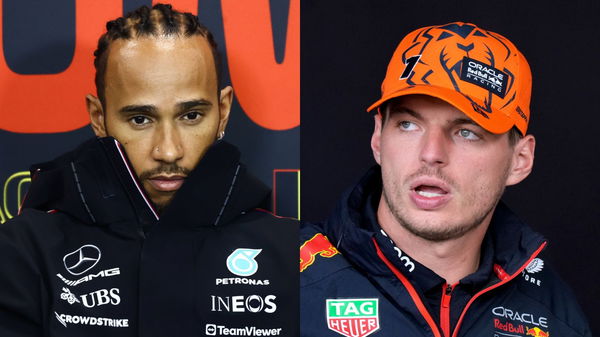
via Imago
Image Courtesy: Imago Lewis Hamilton (L) and Max Verstappen (R)

via Imago
Image Courtesy: Imago Lewis Hamilton (L) and Max Verstappen (R)
Zoom, skid, and a whirl of dust—that’s the stuff of legends on the racetrack, but sometimes, the thrill spills over onto public roads. 9 months ago, Lewis Hamilton‘s midnight escapades in a 1998 Nissan Skyline R34 caused a stir, whipping up a storm of reactions from fans and officials alike. Now, Max Verstappen finds himself skidding on thin ice, facing the glare of legal headlights for an offense that echoes Hamilton’s $198,000 misdemeanor. The question buzzes in the air: Is history repeating itself, or is this a one-upmanship game turned dangerous?
Just a few months ago, Lewis Hamilton’s daring escapade in Japan, sparked outrage as he took to the streets of Tokyo in a 1998 Nissan Skyline R34, a $198,000 supercar. Capturing the late-night drive on Instagram, he showcased himself executing daring doughnuts and pushing the limits of speed. The post caught the attention of fans and critics alike, with snapshots suggesting Hamilton clocked almost 160km/h (99 mph) on Tokyo’s expressway— a startling 60km/h over the speed limit. Japanese fans voiced concerns, condemning his reckless behavior on public roads, and reminding him that such speeds were “strictly prohibited.” But those tracks have long cooled, and now a new story takes the limelight.
🚨 Max Verstappen could be prosecuted based on the AMR Valkyrie video for 'endangering the lives of others'
At the General Directorate of the National Gendarmerie, a specialized cell tracks down these kinds of videos broadcasted on social networks.
[@Nice_Matin] #F1 pic.twitter.com/VJHmKq8rA4— RBR Daily (@RBR_Daily) August 21, 2023
ADVERTISEMENT
Article continues below this ad
Enter Max Verstappen, as he took the limelight in his own audacious stunt, one that has ignited a potential legal firestorm. A leaked video captured Verstappen driving an Aston Martin Valkyrie, worth an astonishing $3.5 million, with just one hand on the wheel. While his display of skill and bravado left many awestruck, it has also attracted attention from authorities. According to Si.com, rumors circulate that Verstappen may face legal repercussions for “endangering the lives of others.” Reports suggest that he was allegedly driving at 120 KPH on a 90 KPH speed-limit road.
Read more: Lewis Hamilton’s Full Blooded Complaint Forces FIA Into Internal Investigation
While the thrill of speed and the love for extraordinary machines may be at the heart of F1 racing, these incidents involving Hamilton and now Verstappen have sparked a discussion on responsibility and ethics off the track. In addition to his daredevil exploits on the racetrack, Max Verstappen has found himself in the spotlight for more than just his driving skills.
ADVERTISEMENT
Article continues below this ad
Max Verstappen’s financial choice under scrutiny
Max Verstappen’s choice to reside in Monaco, renowned as a tax haven, has sparked discussions surrounding the impact of his financial residency on his tax liability. By living in the Principality, Verstappen avoids paying income tax on his substantial earnings, a considerable advantage given his annual income of around 64 million euros. Monaco’s policy of not taxing individuals on their income presents a stark contrast to the Netherlands’ top income tax rate of 49.5%.

via Imago
F1 Gran Prix of Belgium Max Verstappen of Red Bull Racing in the paddock before the F1 Grand Prix of Belgium at Spa Francorchamps on July 30, 2023 Stavelot, Belgium. Stavelot Spa Francorchamps Belgium Copyright: xMarcoxCanonierox
Responding to a report that claimed Verstappen was “avoiding tax” by residing in Monaco, his manager, Raymond Vermeulen, swiftly countered the allegations. He emphasized that Verstappen and his team adhere to international tax regulations and pay taxes where they generate income as sports professionals. Vermeulen clarified that taxes are paid on Verstappen’s sports performances in the Netherlands, including earnings from events like the Dutch GP. Vermeulen articulated, “Why should we have to pay tax on foreign income there? It would be strange if you paid twice, these are the international rules.”
ADVERTISEMENT
Article continues below this ad
Hamilton and Verstappen’s quests for thrill-seeking have buzzed up fans, but what do you think have they also spun out of control?
WATCH THIS STORY | Timeline of the Controversial F1 Jewelry Ban Causing Lewis Hamilton to Face-Off With the FIA
ADVERTISEMENT
ADVERTISEMENT
ADVERTISEMENT
ADVERTISEMENT

